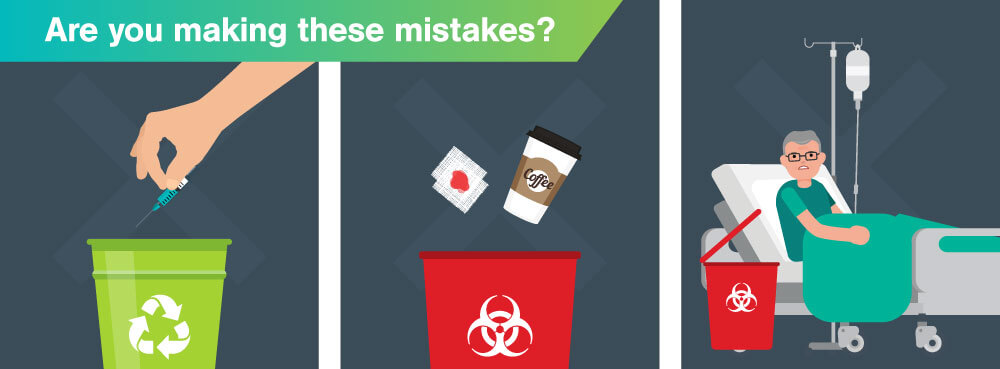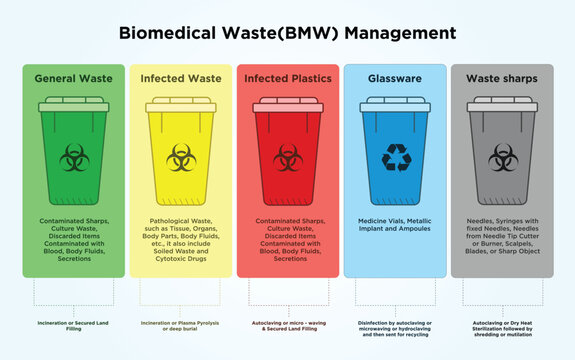Reliable Techniques of Medical Waste Disposal
Effective techniques of clinical waste disposal are vital in maintaining public wellness and environmental safety and security. Clinical waste, consisting of sharps, pathological waste, and pharmaceutical waste, must be handled and gotten rid of properly to avoid the spread of infections and protect the setting. This requires adherence to stringent regulations and the implementation of expert waste management practices.
Appropriate segregation of clinical waste, secure and safe storage space, effective therapy and disinfection techniques, and environmentally-friendly disposal options are key parts of an effective medical waste disposal system. Professional waste monitoring solutions play a vital duty in ensuring compliance with laws and minimizing the risks associated with inappropriate disposal. By using these methods, healthcare facilities can contribute to a safer and cleaner setting while guarding the well-being of the community.
Correct Partition of Clinical Waste
Correct segregation of medical waste is necessary for making certain the safe and reliable disposal of these possibly hazardous materials. Clinical waste describes any kind of waste produced during health care tasks, such as healthcare facilities, clinics, research laboratories, and study centers. It consists of a variety of products, such as made use of needles, syringes, infected dressings, ended or extra medicines, and biological materials.
By setting apart medical waste, health care centers can lessen the danger of infections, injuries, and ecological contamination. The process includes categorizing waste right into various types, such as sharps, transmittable waste, pharmaceutical waste, and non-hazardous waste. Each type calls for certain handling, packaging, and disposal methods to avoid exposure to healthcare employees, waste administration employees, and the general public.
To make certain appropriate segregation, healthcare facilities should develop clear standards and offer sufficient training to employee. This consists of educating workers on the various waste groups, proper product packaging methods, and using suitable containers - WasteX Medical Waste Disposal. In addition, clear signage and color-coding systems can be carried out to promote the identification and segregation of different waste kinds
Safe and Secure Storage of Medical Waste
Safe and protected storage space of clinical waste is important for keeping the honesty and control of possibly unsafe products. Correct storage space not just shields healthcare employees and the public from exposure to harmful substances however likewise stops ecological contamination.
To make certain safe storage space, clinical centers must adhere to details guidelines. Waste must be kept in watertight and puncture-resistant containers that are classified appropriately - medical waste removal service.
Appropriate segregation of clinical waste is also important for secure storage. Various types of waste, such as sharps, transmittable materials, and pharmaceutical waste, need to be separated to protect against cross-contamination. This segregation can be attained through the usage of color-coded containers or containers.
Regular tracking and inspection of the storage area are crucial to identify any type of potential dangers or violations. This includes checking for signs of damages or degeneration in the containers, ensuring appropriate air flow, and keeping an eye on temperature level and moisture degrees.
Efficient Therapy and Disinfection Approaches

One typically used therapy approach is autoclaving, which includes subjecting the waste to high-pressure heavy steam at temperature levels over 121 levels Celsius. Another method is incineration, which entails shedding the waste at high temperatures.
Chemical sanitation is an additional efficient method for dealing with clinical waste. This method entails making use of disinfectants such as chlorine compounds, phenolic substances, or hydrogen peroxide to eliminate or inactivate pathogens (WasteX Medical Waste Disposal). Chemical disinfection is commonly utilized for liquid waste, such as lab examples or physical fluids
Over the last few years, alternate therapy methods such as microwave sanitation, irradiation, and biological treatment have actually likewise gained interest. These techniques offer benefits such as lowered environmental effect and power intake compared to typical methods.
Environmentally-friendly Disposal Options
In the realm of clinical waste disposal, taking into consideration environmentally-friendly choices is important. Healthcare centers generate a substantial amount of waste, consisting of infectious products, pharmaceuticals, and chemicals, which can pose severe dangers to human health and the setting if not managed effectively. There are several environmentally-friendly disposal alternatives available that can assist alleviate these dangers.
One such alternative is recycling. Recycling clinical waste involves segregating and processing certain materials for view publisher site reuse or repurposing. Plastics, glass, and steel containers can be reused, reducing the demand for new products and minimizing the amount of waste sent to garbage dumps. In addition, some healthcare facilities have carried out reusing programs for sure medical devices or devices, additional minimizing waste generation.
Another environmentally-friendly disposal choice is waste-to-energy conversion. This method includes transforming medical waste into power through procedures like incineration or anaerobic food digestion. medical waste disposal. Incineration, when done effectively with innovative modern technologies, can generate power while decreasing hazardous emissions. Anaerobic digestion, on the other hand, breaks down organic waste in the lack of oxygen, creating biogas that can be used for electricity or heat generation.

Advantages of Professional Waste Monitoring Solutions
One significant advantage of professional waste administration solutions is the enhanced effectiveness in dealing with and getting rid of of medical waste. Medical care facilities create a considerable quantity of waste that consists of dangerous products, such as sharp objects, infected items, and potentially transmittable waste. medical waste removal. Incorrect handling and disposal of clinical waste position significant health dangers to employees, clients, and the basic public. By utilizing expert waste management services, medical care facilities can make sure that all clinical waste is handled and dealt with effectively, reducing the danger of contamination and the spread of conditions.
Specialist waste monitoring solutions use qualified and experienced employees that are knowledgeable about the guidelines and standards for medical garbage disposal. They have access to specialized tools and devices that enable them to take care of various sorts of medical waste safely and efficiently. These solutions additionally have reputable procedures and protocols in position to ensure that waste is segregated, packaged, carried, and disposed of in compliance with local, state, and federal policies.
Additionally, expert waste administration services can provide healthcare centers with thorough waste monitoring remedies. They can supply solutions such as waste collection, therapy, disposal, and transportation, customized to the certain requirements and demands of the facility. This removes the worry of managing waste internally, allowing health care personnel to concentrate on providing top quality person care.
Final Thought
In verdict, reliable methods of medical waste disposal involve proper segregation, risk-free storage, treatment and disinfection, and environmentally-friendly disposal choices. These techniques make certain the secure handling and monitoring of clinical waste, preventing the spread of infections and safeguarding the atmosphere.
Medical waste, including sharps, pathological waste, and pharmaceutical waste, should be dealt with and disposed of appropriately to stop the spread of infections and shield the setting.Correct partition of clinical waste, safe and risk-free storage space, efficient therapy and disinfection methods, and environmentally-friendly disposal options are key components of an effective medical waste disposal system. The procedure entails classifying waste right into different types, such as sharps, infectious waste, pharmaceutical waste, and non-hazardous waste. By utilizing expert waste management services, healthcare centers can make certain that all clinical waste is dealt with and disposed of properly, minimizing the threat of contamination and the spread of illness.
Professional waste management solutions utilize knowledgeable and qualified personnel that are experienced regarding the policies and guidelines for clinical waste disposal.